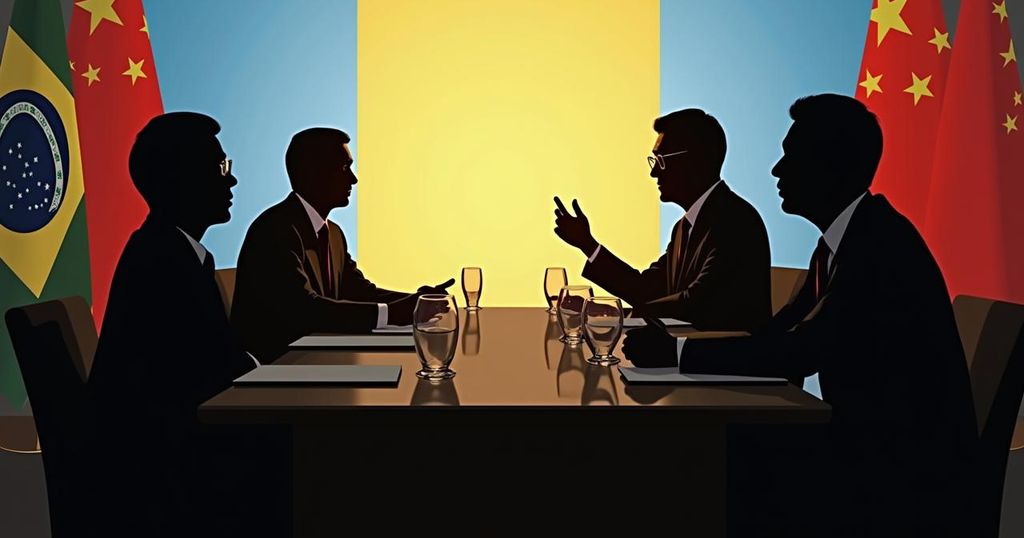In a significant diplomatic engagement, China and Brazil initiated discussions to rally support for a peace plan aimed at ending the conflict in Ukraine during the United Nations General Assembly. Despite Ukrainian President Zelenskiy’s criticism of the plan for potentially aiding Moscow, the countries gathered representatives from several nations, emphasizing the importance of peaceful coexistence and collaborative efforts to avert escalation of the war.
At the United Nations General Assembly, China and Brazil have taken steps to promote their peace plan concerning the ongoing conflict in Ukraine, seemingly undeterred by the disapproval expressed by Ukrainian President Volodymyr Zelenskiy. The two countries organized a meeting with representatives from seventeen nations, where discussions led by China’s Foreign Minister Wang Yi and Brazilian foreign policy adviser Celso Amorim concentrated on strategies to mitigate the risk of escalation in the war, including the prevention of the use of nuclear weapons and safeguarding nuclear plants. Wang emphasized the critical nature of fostering peaceful relations between Russia and Ukraine, stating, “Russia and Ukraine are neighbors that cannot be moved away from each other and amity is the only realistic option.” He advocated for a global initiative supporting a peace conference that includes both parties to the conflict. The meeting highlighted a communique endorsed by Brazil, China, and ten additional Global South nations, including Indonesia, South Africa, and Turkey. This effort builds on a prior six-point plan introduced by the two leading countries in May of this year, with Amorim noting the continuous collaboration under a coalition dubbed “friends for peace.” The backdrop to these discussions involves a previously established partnership between China and Russia, which was formalized by President Xi Jinping in 2022, shortly before the commencement of the war. Although China has refrained from supplying arms to Russia, Western officials accuse Chinese companies of providing materials utilized in the production of military supplies for the conflict. In response to the peace initiative, President Zelenskiy criticized Brazil and China, questioning their motives for proposing alternatives to his own peace strategies. He expressed concern that such proposals might inadvertently grant Russia greater leeway to pursue military objectives. In reply to Zelenskiy’s remarks, Amorim stated, “I’m not here to respond either to Zelenskiy or Putin, just to propose a way for peace.”
The ongoing conflict in Ukraine, ignited by Russia’s invasion, has generated significant international discourse on peace efforts. Prominent nations, particularly those in the Global South, are increasingly seeking avenues for mediation and resolution. China and Brazil, having established a collaborative framework, are pushing for a unified approach to peace negotiations that involve both conflicting parties. The backdrop of these efforts is characterized by Russia’s declared partnership with China, raising concerns among Western nations regarding the potential support that Beijing might extend to Moscow. Given this geopolitical context, the peace initiatives from Brazil and China manifest a dual objective: addressing the aspirations of developing nations for peace while simultaneously managing relations with Russia. As such, these discussions occur amid a complex international landscape, demanding sensitivity to the perspectives of multiple stakeholders.
The pursuit of a peace plan for Ukraine by China and Brazil reflects their commitment to engage developing nations in resolving the conflict. Despite criticisms from Ukrainian leadership, the dialogues aim to establish a framework that prioritizes peace and stability. This approach seeks to address broader geopolitical relationships while advocating for negotiations involving both Russia and Ukraine. The situation remains fluid and complex, with ongoing dialogues expected to shape future interactions among the involved nations.
Original Source: www.usnews.com







